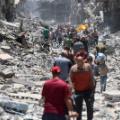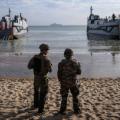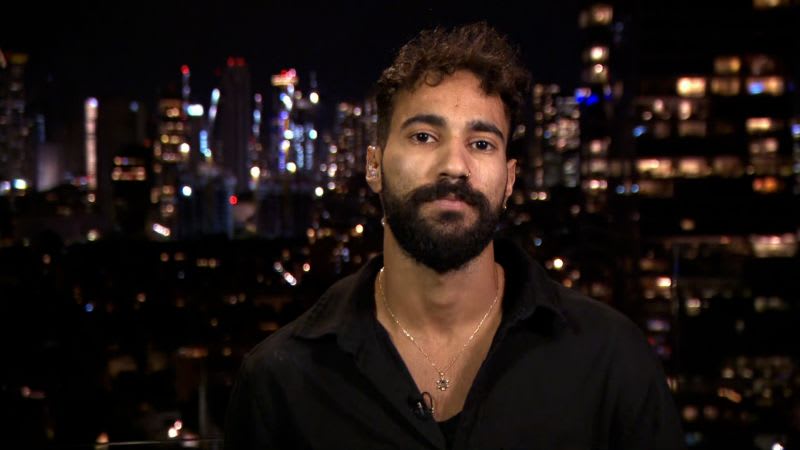Our live coverage of Israel's war against Hamas has moved here.
January 4, 2024 Israel-Hamas war
By Kathleen Magramo, Sana Noor Haq, Antoinette Radford, Matt Meyer and Aditi Sangal, CNN
"No food, no water, very little medical supplies": UN aid worker on devastating conditions in Gaza
From CNN's Michael Rios
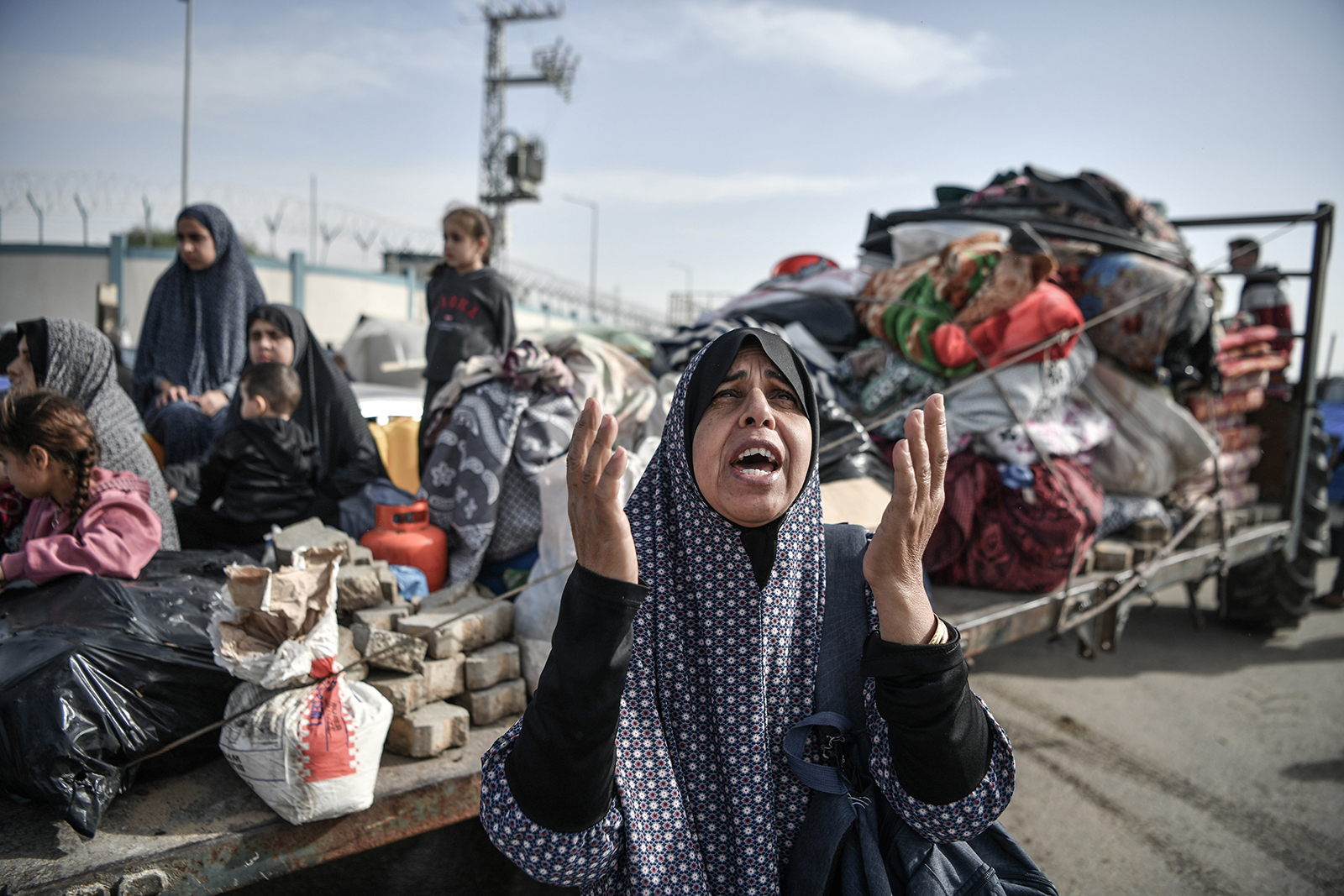
Suffering is everywhere in Gaza and no place is safe for displaced civilians, a United Nations aid worker said Thursday, as she detailed the harrowing conditions in the enclave.
Gemma Connell, Gaza team leader for the UN Office for the Coordination of Humanitarian Affairs (OCHA), said she had witnessed high levels of devastation across the enclave over the past month.
Many people arriving in southern Gaza “have been displaced not once, not twice, but six or seven times,” she told CNN’s Christiane Amanpour.
Connell also described the desperation in the north.
"I have never in my humanitarian career seen the level of suffering, desperation and deprivation that the people who are across that checkpoint are suffering," she said.
“No food, no water, very little medical supplies.”
Connell also pushed back on Israeli accusations that the UN’s Palestinian refugee agency is “stalling,” as aid trickles into Gaza from two southern border crossings.
“The fact that all of us here wake up every day, trying to get assistance out, is proof positive of the fact that we are not stalling. There are many challenges," she said, citing the multiple screenings aid trucks have to go through.
Connell also said more attention should be given to the fate of the 2.2 million people in Gaza who are in desperate need of help.
“My biggest fear is that the world doesn't see the people of Gaza as the humans that they are,” she said. “And yet every day that’s exactly what I see — is the humans of Gaza and the devastating and catastrophic toll of this war on humans.”
Witness says attackers laughed as they raped and murdered a woman in Israel on October 7
From CNN's Jake Tapper, Kirsten Appleton and Rachel Clarke
Editor's Note: This report contains graphic and disturbing accounts of sexual violence.
Five men came out of the van and captured a woman, ripping off her clothes as they formed a circle around her. One raped her and killed her with a knife. Then he raped her again, said Raz Cohen, a survivor of Hamas’ murderous rampage in Israel on October 7.
Cohen had gone to the Nova music festival in the desert of southern Israel to be with his girlfriend of two months, Maya. She tried to flee with another friend and was killed, he said. Cohen saw another young woman shot in the head as he ran to hide in a bush — the spot where he witnessed the rape, he told CNN.
Israeli police are documenting cases of rape and sexual violence committed as Hamas fighters burst into Israel from Gaza, attacking the music festival and kibbutz communities near the border. About 1,200 people were killed and more than 200 taken hostage in the attacks that were condemned globally and led to a massive Israeli military response. Israel’s subsequent war on Hamas in Gaza has claimed the lives of more than 22,000 Palestinians, according to the Hamas-controlled Ministry of Health.
But the United Nations and human rights organizations were slow to denounce the reports of rape and mutilation against Israelis — mostly girls and women but also men. And Hamas has denied its fighters committed sexual violence during the coordinated attacks.
The UN agency UN Women released a statement in December condemning the attacks and saying it was “alarmed by the numerous accounts of gender-based atrocities and sexual violence during those attacks.”
“It’s a fact,” Cohen said. “It’s what happened.”
Cohen said a white van pulled up about 30 meters from his hiding spot and five men in civilian clothes got out.
“They catch a girl and they started to pull her clothes off,” he said. “After they pulled the clothes off, one of them started to rape her. It was something like 40 seconds. After he raped her, he take a knife and kill her, murder her. After he did it, he continued to rape the dead body.”
The other men around the victim did not seem angry, Cohen said.
“They always laugh. I think it was for fun. They murdered a lot of people for fun.”
Read the full story:
Israel preps for new phase of war as displaced Palestinians face dismal conditions. Here's the latest
From CNN staff
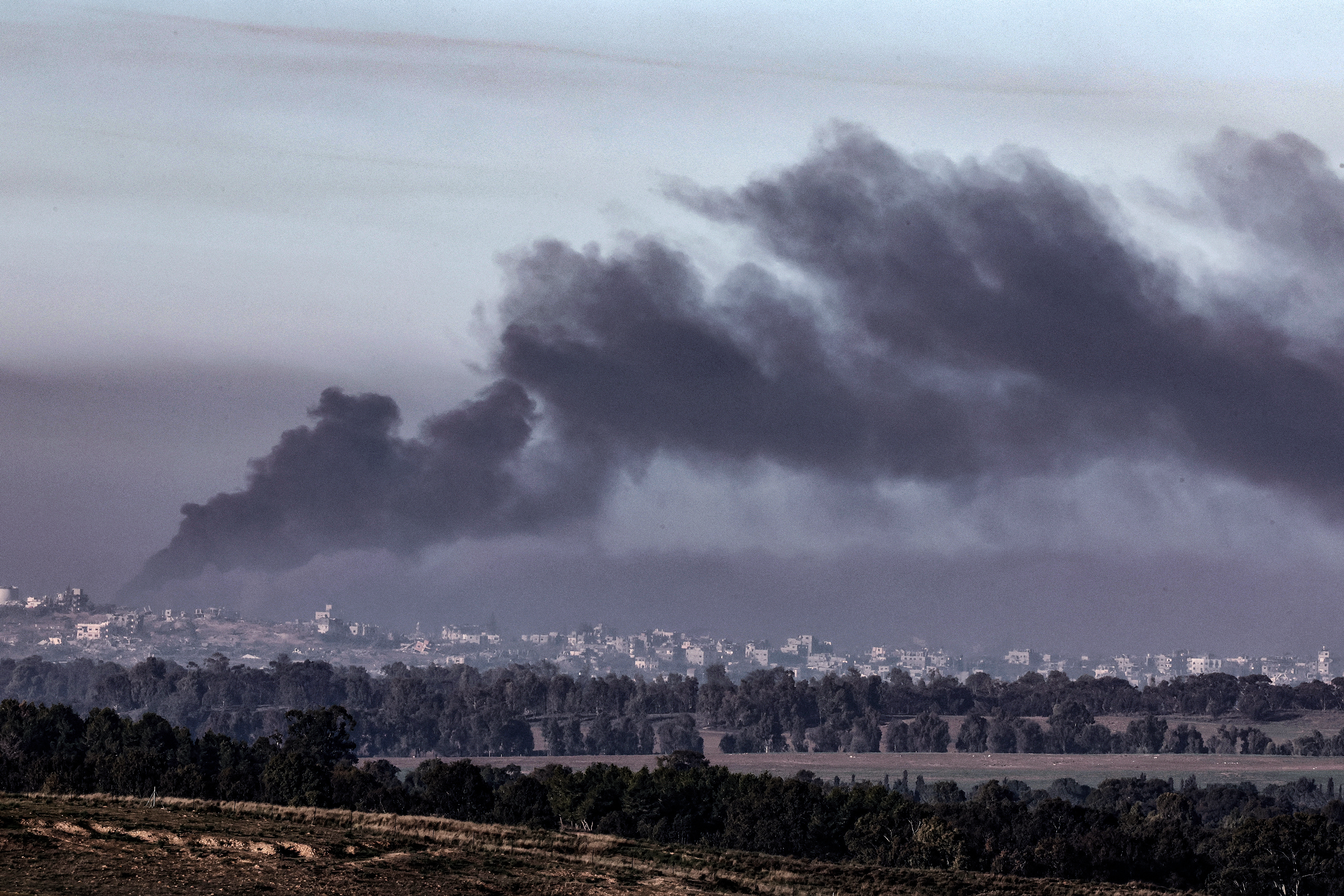
Israeli Defense Minister Yoav Gallant on Thursday unveiled plans for the next phase of the war in Gaza, featuring a new combat approach in the north and a sustained focus on targeting Hamas leaders in the enclave’s southern territory.
The defense minister's outline of the next phase of the war came as the humanitarian crisis in Gaza continues to worsen.
The Israel Defense Forces has expanded operations in central and southern Gaza, issuing a new series of evacuation instructions to Palestinians, many of whom were already displaced. Several civilians in central Gaza told CNN they were too exhausted to flee again — instead wishing they could return home to “die with dignity.”
Hundreds of thousands of civilians are living in tent camps stretched along cities in the south, with little access to basic sanitation, food, fuel or drinkable water. Many sleep on the streets with inadequate clothing to keep them warm during the winter season.
Catch up on the latest:
- US pressures Israel on protecting Gaza civilians: The "results" in Gaza on protecting civilians "continue to not match where the Israeli intentions are," US State Department spokesperson Matt Miller said Thursday, adding that it will be a subject of discussion during US Secretary of State Antony Blinken's coming trip to the region. The US has steadfastly supported Israel's war on Hamas, but the weeks of constant Israeli strikes in Gaza that have killed thousands of civilians have exposed rifts between the close allies.
- Call for ceasefire: The deputy foreign minister of the Palestinian Authority has urged Blinken to call for an immediate ceasefire in Gaza during his visit. Speaking to CNN's Zain Asher on Thursday, Amal Jadou claimed Israel is "pushing the entire region into confrontation," which is not "engendering peace."
- Latest on the Israel-Lebanon border: The head of the UN interim forces in Lebanon met with Lebanese officials Thursday to discuss the situation at the border with Israel, while Israeli officials vowed to address security concerns in a meeting on the same issue with a US envoy. Clashes between Israel and the Iran-backed paramilitary group Hezbollah — which operates in southern Lebanon — have been further inflamed by the killing of a senior Hamas leader in Beirut.
- ISIS claims attack in Iran: ISIS claimed responsibility Thursday for the deadly dual bombings at a military commander's memorial in southeastern Iran. Accusations flew in the time between the blasts and ISIS' statement: Iranian President Ebrahim Raisi blamed Israel for the deadly explosions, feeding fears that a wider regional conflict could grow during the Israel-Hamas war. Israel's military has not issued a comment on the attack.
- UN expresses concern over far-right Israeli ministers comments: The United Nations human rights chief Volker Turk says he was "very disturbed" by remarks made by two far-right Israeli government ministers this week pushing for the resettlement of Gaza civilians outside the Gaza Strip to "third countries."
- Hostages in Gaza: The Israel Defense Forces now believes three Israelis missing since Hamas' October 7, 2023, attacks are being held hostage in Gaza, military spokesperson Daniel Hagari said Thursday. Israel's military has said its official tally of hostages held in Gaza can fluctuate as it receives the latest intelligence. Israel believes there are now 108 hostages alive in Gaza, who were taken captive during the attack.
Israeli defense minister outlines plan for new phase in Gaza war
From CNN's Niamh Kennedy in Dublin and Lauren Izso in Tel Aviv
Israeli Defense Minister Yoav Gallant on Thursday unveiled plans for the next phase of the war in Gaza, featuring a new combat approach in the north and a sustained focus on targeting Hamas leaders in the enclave’s southern territory.
In the third phase, Israel Defense Forces soldiers in northern Gaza will adopt a “new combat approach” encompassing “raids, the destruction of terror tunnels, aerial and ground activities, and special operations,” according to Gallant.
In southern Gaza, the Israeli military will continue its pursuit of Hamas leaders in the region “for as long as necessary,” Gallant said. Israeli forces stationed in the south will also focus on “enabling the return of the hostages” still in captivity, he added.
Post-war planning: In a three-page document, Gallant also provided details of the fourth and supposed final phase of the war, entitled the "Day After."
The post-war phase announced by Gallant envisages a Gaza Strip no longer controlled by Hamas, which would no longer “pose a security threat to the citizens of Israel.”
Once the "goals of the war have achieved" there would be "no Israeli civilian presence in the Gaza Strip," according to his plan.
Israel would, however, maintain its “operational freedom of action in the Gaza strip” and continue to "carry out the inspection of goods entering the Gaza strip," the plan stated.
The defense minister also unveiled the concept of a multinational task force led by the United States in partnership with "European and regional partners” charged with the "rehabilitation" of the strip.
In this phase, Israel would also continue dialogue with Egypt, a country Gallant described as a "major actor."
The minister provided scant detail on the future governance of the enclave, however, merely saying that the entity controlling the territory would build on the capabilities of "non-hostile" elements already present in Gaza.
Talks for a pathway to Palestinian state: US officials have previously said they ultimately envision both Gaza and the West Bank being ruled by a unified government led by a “revitalized” Palestinian Authority. At present, the Palestinian Authority exercises limited self-rule in the West Bank, having lost control of the Gaza Strip to Hamas in 2007.
An Arab delegation comprising officials from Saudi Arabia, Qatar, Jordan, Turkey and the Palestinian Authority emphasized in a meeting with US Secretary of State Antony Blinken in December that Arab states will need assurances that there is a path toward a Palestinian state if they are going are to play a role in the reconstruction of Gaza.
CNN's Jennifer Hansler, Priscilla Alvarez and Natasha Bertrand contributed to this report.
3 Israelis missing since October 7 attacks believed to be held hostage in Gaza, military spokesperson says
From CNN’s Lauren Izso in Tel Aviv and Sugam Pokharel in London
The Israel Defense Forces now considers three Israelis missing since Hamas' October 7, 2023, attacks as being held hostage in Gaza, military spokesperson Daniel Hagari said Thursday.
Israel's military has said their official tally of hostages held in Gaza can fluctuate as they receive the latest intelligence.
Israel believes there are now 108 hostages alive in Gaza, who were taken captive during the attack. Twenty-four other hostages taken on October 7 are known to be dead, and their bodies remain in Gaza.
One Israeli national is still considered missing following the attack, according to the Israeli prime minister’s office.
Before the October 7 attack, there were already four hostages being held by Hamas since 2014, the office said, bringing the total number of hostages in Gaza to 112, not including the 24 that are known to be dead.
Palestinians forced to flee in central Gaza tell CNN they would "prefer to go back home and die with dignity"
From CNN's Abeer Salman and Sana Noor Haq
Donkey carts crammed with blankets, mattresses piled onto cars and thinly-stocked market stalls lined the mud-caked streets of Nuseirat, in central Gaza, on Thursday, through which streams of displaced people were making their way to the nearby area of Deir al-Balah.
Many had mixed emotions. Deir al-Balah was supposed to be safer, at least according to instructions from the Israeli military, but living conditions were at best primitive.
Generations of Palestinians were camped out among the rubble of flattened buildings, while others carried their belongings to move further south, as the Israeli military expanded its operations in central and southern Gaza.
On Thursday, the Israel Defense Forces issued a new series of evacuation instructions to Palestinians, including that “military activities” would be temporarily suspended in the Al-Brook and Jaffa neighborhoods of Deir al-Balah.
Amnesty International has previously warned that the Israeli military's calls to evacuate could amount to “forced displacement of the civilian population,” in violation of international law.
The war that began on October 7 has displaced at least 1.93 million people in Gaza, according to the UN Relief and Works Agency for Palestine Refugees (UNRWA). Thousands of families have moved multiple times as Israel’s offensive has moved to new areas.
Several of the civilians who had fled to Deir al-Balah told CNN they were too exhausted to flee again – instead wishing they could return home to “die with dignity.”
Ramzi Al Jammal, a civilian from Al-Bureij refugee camp, was displaced to Al-Aqsa Martyrs Hospital. He has been separated from members of his extended family, including his sons and his grandchildren.
There are no tents, no food, no water, people swarm the storage warehouses, it’s a very difficult situation. I would prefer to die in my house,” Al Jammal said. “I regret leaving my house, I wish we were together so we die together or live together.”
Hundreds of thousands of displaced Palestinians are living in tent camps stretched along cities in the south, with little access to basic sanitation, food, fuel or drinkable water. Many sleep on the streets with inadequate clothing to keep them warm during the winter season.
But Abdul Rahman, a civilian who has not fled Nuseirat, told CNN that trying to survive in makeshift camps was no better than living among the ruins of central and northern Gaza.
“We have no place to go,” he said on Thursday. “There is no space, people sleep on the road. There is no place to sit safely in this area.
“There is no water, there is no electricity,” he said. “They bomb and attack us without any alarm … We have nothing to do, we have no food.”
Abu Adnan, a displaced civilian who now lives on the streets of Deir al-Balah, told CNN he wishes he had “stayed at home and got shot.”
“This is not life, it’s humiliation,” he said. “I will go nowhere after this, unless I go back to my house.”
“I tried to go back home twice but my children pulled me back,” he added. “There are no toilets, no food, no water, no clothes. With all this, I prefer to go back home and die with dignity than dying this way.”
Israel's "results" in protecting Gaza civilians don't match its stated intentions, US State Department says
From CNN's Jennifer Hansler
The "results" in Gaza on protecting civilians "continue to not match where the Israeli intentions are," US State Department spokesperson Matt Miller said Thursday.
"That's certainly something that we will talk about" in Israel, Miller told CNN.
In his most recent trip to Israel late last year, US Secretary of State Antony Blinken said the Israeli government understood the need to take specific steps to protect civilians as it prosecutes its war in Gaza.
"We have seen them take a number of steps to try to minimize" civilian harm, Miller said, "and we will encourage them to continue to do more."
More background: The US has steadfastly supported Israel's war on Hamas, but the weeks of constant Israeli strikes in Gaza that have killed thousands of civilians have exposed rifts between the governments of US President Joe Biden and Israeli Prime Minister Benjamin Netanyahu.
Biden has repeatedly warned Israel that global support for the country's military campaign is waning, and urged the Israeli military to be more precise with its attacks and focused on saving civilian lives.
Israeli military officials have said they devote "vast resources" to minimizing harm to civilians in Gaza and that Hamas bears the blame for using civilians as "human shields."
UN human rights chief "very disturbed" by Israeli far-right ministers’ call to resettle Gazans
From CNN's Niamh Kennedy in Dublin
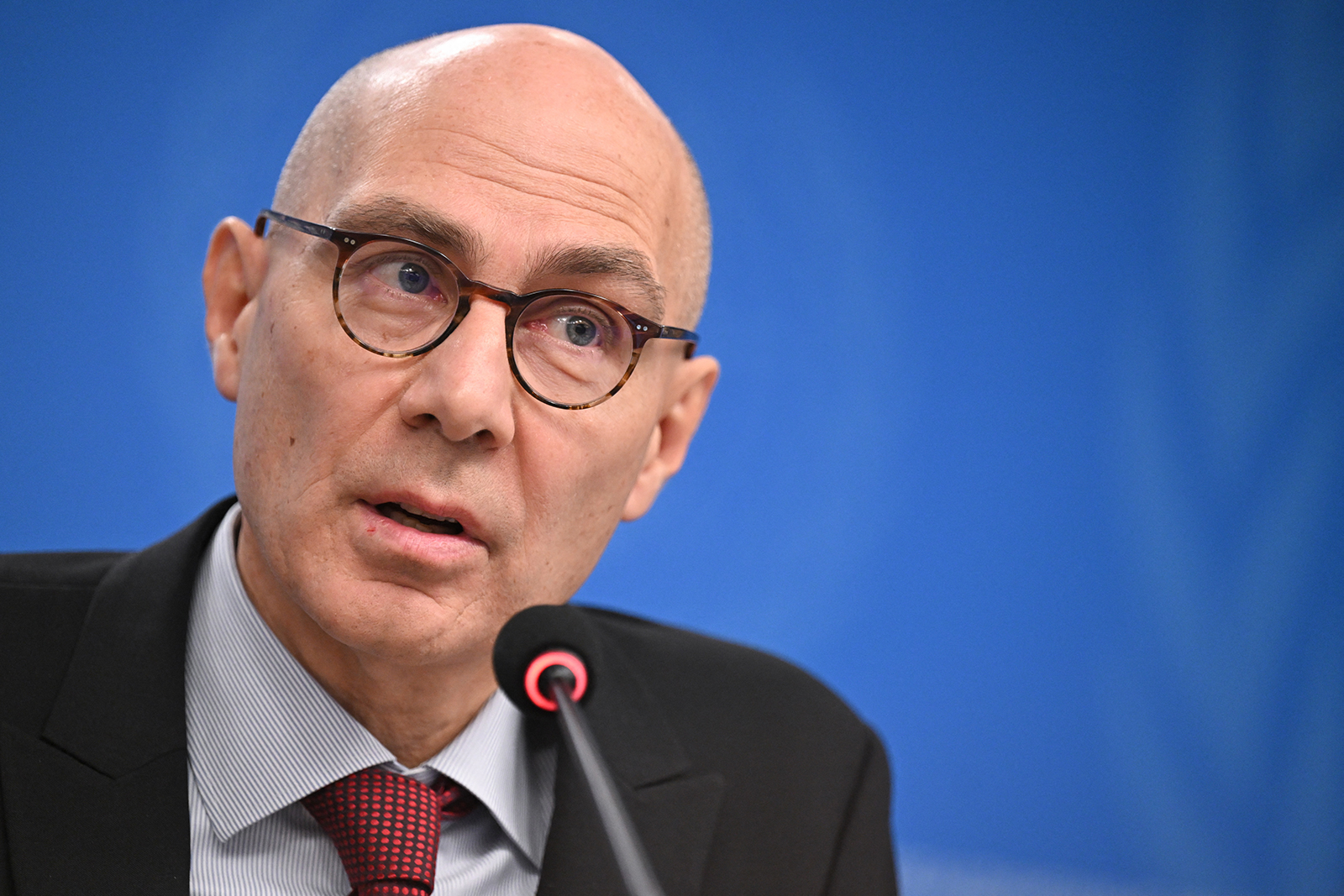
The United Nations human rights chief Volker Turk says he was "very disturbed" by remarks made by two far-right Israeli government ministers this week pushing for the resettlement of Gaza civilians outside the Gaza Strip to "third countries."
About 85% of Gazans have been internally displaced by the war and have the right to return to their homes, Turk wrote in a post on X, formerly Twitter, Thursday.
He reiterated that under international humanitarian law, the forcible transfer of protected persons within or from an occupied territory is forbidden.
Some context: Israel's Finance Minister Bezalel Smotrich and National Security Minister Itamar Ben Gvir sparked outrage this week by making comments advocating for resettlement.
Smotrich had posited that the removal of Gazans from the strip could pave the way for Israelis to "make the desert bloom." He later clarified that he envisioned any transfers of Gazans being carried out on a voluntary basis.
Separately, Ben Gvir had suggested that the current conflict represented an “opportunity to concentrate on encouraging the migration of the residents of Gaza.”
Their comments had been criticized by several countries, including the United States, whose State Department denounced the remarks as "inflammatory and irresponsible."
